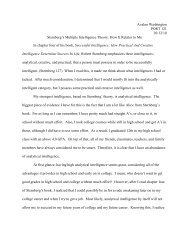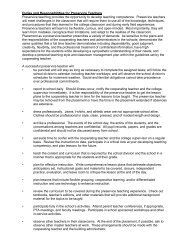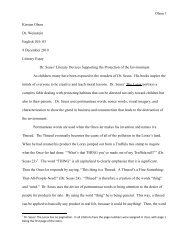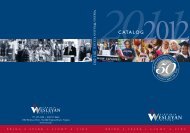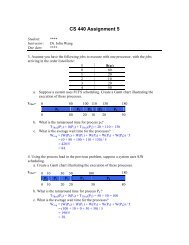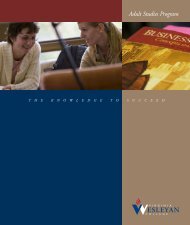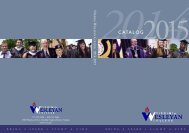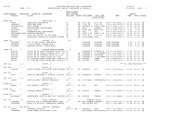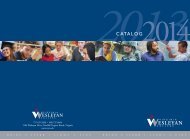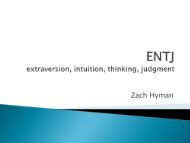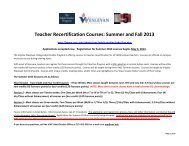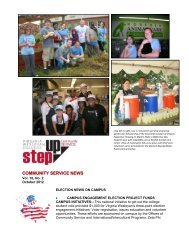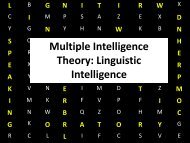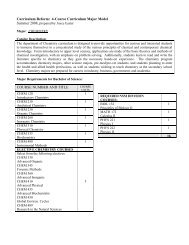2008-2009 Catalog - Virginia Wesleyan College
2008-2009 Catalog - Virginia Wesleyan College
2008-2009 Catalog - Virginia Wesleyan College
- No tags were found...
You also want an ePaper? Increase the reach of your titles
YUMPU automatically turns print PDFs into web optimized ePapers that Google loves.
PLAN OF STUDY 23distribution listed above. As with Frames ofReference courses, a course used to fulfill the SeniorIntegrative Experience requirement may also be usedto meet a major or minor requirement. SeniorIntegrative Experience courses are only available tostudents who have completed (or will completebefore the course begins) at least 75 semester hourstoward graduation and who have, in the judgmentof the individual student’s adviser, completed mostof VWC’s General Studies requirements.See course listings in this catalog and online for agiven semester to identify courses which fulfill thisrequirement.8. The Divisional RequirementAmong the courses used to satisfy the GeneralStudies program, a minimum of three semesterhours must be completed successfully in each of thecollege’s three academic divisions: Humanities,Natural Sciences and Mathematics, and SocialSciences.The Frames of Reference and SeniorIntegrative ExperienceAesthetic UnderstandingCourses bearing the Aesthetic Understanding (A)designation explore visual art, music, theatre and film.These courses provide students with the opportunity tounderstand our cultural heritage as expressed in worksof artistic expression created by others and/or to createthese kinds of works themselves. Students study thecreative process itself in order better to understand andevaluate works intended to provoke an aestheticresponse.Goals:• To become acquainted with major achievements inthe arts.• To explore the cultural and historical context ofartistic achievements.• To learn techniques for critical analysis andappreciation of works of art.• To acquire an appropriate vocabulary with whichto articulate this knowledge.• (In classes focusing on creative experience) Tolearn the techniques, discipline, and value ofcreating works intended to evoke an aestheticresponse.CommunicationCourses bearing the Communication (C) designationfocus on the processes and systems of language, verbal ornon-verbal. Students will pay particular attention tosigns and symbols, the nature and transfer of meaning,channels or carriers of communication and theirrelation to society, and fundamentals of rhetoric. Thesecourses will help students understand the encoding anddecoding of symbol systems in order to effectivelycommunicate to various audiences.Goals:• To develop an awareness of the processes andsystems of interpersonal, group or masscommunication.• To understand several of the formal expressivepatterns through which humans have attempted toconvey meanings.• To evaluate the quality of evidence, negotiateconflicting positions, and analyze the effectivenessof a text’s approach.• To understand the rhetorical concerns of communication,including audience expectations andappropriate strategies.Empirical KnowledgeCourses bearing the Empirical Knowledge (E)designation use the empirical method to provide ameans of gaining knowledge about natural or socialphenomena through systematic observation and directexperience. Empirical observations are used to developexplanatory theories capable of being supported orrefuted.Goals:• To study the systematic observation of natural,social, or behavioral phenomena utilizingquantitative and/or qualitative methods.• To discuss the development of explanatory theoriesbased on systematic observation or experience.• To test predictions in order to verify or refutetheories or hypotheses.• To examine the strengths and limitations of theempirical approach and explore how empiricallybased claims differ from those based on othermodes of knowledge.Historical PerspectivesCourses bearing the Historical Perspectives (H)designation focus on studying how societies change overtime. This endeavor concentrates on understanding howpolitics, values, beliefs, cultures, and individuals interactwith and reflect specific historical contexts. Thisemphasis on historical context excludes courses that aretopically focused on a specific discipline (i.e., the historyof history).Goals:• To demonstrate understanding of how societieschange over time.• To learn how to interpret and to evaluate primarymaterials within both their historical contexts andfrom later historical perspectives.• To cultivate independent arguments abouthistorical developments based on the study ofprimary materials.Institutional and Cultural SystemsCourses bearing the Institutional and Cultural Systems (S)designation focus on human society and its attempts toattain goals valued collectively. Special emphasis is placedon developing a better and more critical understanding ofthe institutions and cultural systems that play anincreasingly significant role in contempoary life.



